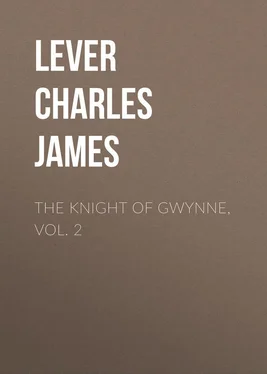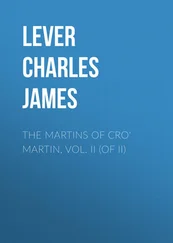Charles Lever - The Knight Of Gwynne, Vol. 2
Здесь есть возможность читать онлайн «Charles Lever - The Knight Of Gwynne, Vol. 2» — ознакомительный отрывок электронной книги совершенно бесплатно, а после прочтения отрывка купить полную версию. В некоторых случаях можно слушать аудио, скачать через торрент в формате fb2 и присутствует краткое содержание. Жанр: foreign_antique, foreign_prose, на английском языке. Описание произведения, (предисловие) а так же отзывы посетителей доступны на портале библиотеки ЛибКат.
- Название:The Knight Of Gwynne, Vol. 2
- Автор:
- Жанр:
- Год:неизвестен
- ISBN:нет данных
- Рейтинг книги:4 / 5. Голосов: 1
-
Избранное:Добавить в избранное
- Отзывы:
-
Ваша оценка:
- 80
- 1
- 2
- 3
- 4
- 5
The Knight Of Gwynne, Vol. 2: краткое содержание, описание и аннотация
Предлагаем к чтению аннотацию, описание, краткое содержание или предисловие (зависит от того, что написал сам автор книги «The Knight Of Gwynne, Vol. 2»). Если вы не нашли необходимую информацию о книге — напишите в комментариях, мы постараемся отыскать её.
The Knight Of Gwynne, Vol. 2 — читать онлайн ознакомительный отрывок
Ниже представлен текст книги, разбитый по страницам. Система сохранения места последней прочитанной страницы, позволяет с удобством читать онлайн бесплатно книгу «The Knight Of Gwynne, Vol. 2», без необходимости каждый раз заново искать на чём Вы остановились. Поставьте закладку, и сможете в любой момент перейти на страницу, на которой закончили чтение.
Интервал:
Закладка:
“It is better to do so,” said Lady Eleanor, with an utterance from which a great effort had banished all agitation; “Helen and I are safe and well here, and as happy as we can be when away from you and Lionel.”
“Poor Lionel!” said the Knight, tenderly; “what good news for him it would be were they to give me some staff appointment, – I might have him near us. Come, Eleanor,” added he, with more gayety of manner, “I feel a kind of presentiment of good tidings. But we are forgetting Bagenal Daly all this time; perhaps this letter of his may throw some light on the matter.”
Darcy now broke the seal of Daly’s note, which, even for him, was one of the briefest. This was so far fortunate, since his writing was in his very worst style, blotted and half erased in many places, scarcely legible anywhere. It was only by assembling a “committee of the whole house” that the Darcys were enabled to decipher even a portion of this unhappy document. As well as it could be rendered, it ran somewhat thus: —
“The verdict is against us; old Bretson never forgave you carrying away the medal from him in Trinity some fifty years back; he charged dead against you; I always said he would. Summum jus, summa injuria – The Chief Justice – the greatest wrong! and the jury the fellows who lived under you, in your own town, and their fathers and grandfathers! at least, as many of the rascals as had such. – Never mind, Bicknell has moved for a new trial; they have gained the ‘Habere’ this time, and so has O’Halloran – you heard of the thrashing – ”
Here two tremendous patches of ink left some words that followed quite unreadable.
“What can this mean?” said Darcy, repeating the passage over three or four times, while Helen made no effort to enlighten him in the difficulty. Battled in all his attempts, he read on: “‘I saw him in his way through Dublin last night,’ Who can he possibly mean?” said Darcy, laying down the letter, and pondering for several minutes.
“O’Halloran, perhaps,” said Lady Eleanor, in vain seeking a better elucidation.
“Oh, not him, of course!” cried Darcy; “he goes on to say, that ‘he is a devilish high-spirited young fellow, and for an Englishman a warm-blooded animal.’ Really this is too provoking; at such a time as this he might have taken pains to be a little clearer,” exclaimed Darcy.
The letter concluded with some mysterious hints about intelligence that a few days might disclose, but from what quarter or on what subject nothing was said, and it was actually with a sense of relief Darcy read the words, “Yours ever, Bagenal Daly,” at the foot of the letter, and thus spared himself the torment of further doubts and guesses.
Helen was restrained from at once conveying the solution of the mystery by recollecting the energy she had displayed in her scene with Mr. Dempsey, and of which the shame still lingered on her flushed cheek.
“He adds something here about writing by the next post,” said Lady Eleanor.
“But before that arrives I shall be away,” said the Knight; and the train of thought thus evoked soon erased all memory of other matters. And now the little group gathered together to discuss the coming journey, and talk over all the plans by which anxiety was to be beguiled and hope cherished till they met again.
“Miss Daly will not be a very importunate visitor,” said Lady Eleanor, dryly, “judging at least from the past; she has made one call here since we came, and then only to leave her card.”
“And if Helen does not cultivate a more conciliating manner, I scarce think that Mr. Dempsey will venture on coming either,” said the Knight, laughing.
“I can readily forgive all the neglect,” said Helen, haughtily, “in compensation for the tranquillity.”
“And yet, my dear Helen,” said Darcy, “there is a danger in that same compact. We should watch carefully to see whether, in the isolation of a life apart from others, we are not really indulging the most refined selfishness, and dignifying with the name of philosophy a solitude we love for the indulgence of our own egotism. If we are to have our hearts stirred and our sympathies strongly moved, let the themes be great ones, but above all things let us avoid magnifying the petty incidents of daily occurrence into much consequence: this is what the life of monasteries and convents teaches, and a worse lesson there need not be.”
Darcy spoke with more than usual seriousness, for he had observed some time past how Helen had imbibed much of Lady Eleanor’s distance towards her humble neighbors, and was disposed to retain a stronger memory of their failings in manner than of their better and heartier traits of character.
The young girl felt the remark less as a reproof than a warning, and said, —
“I will not forget it.”
CHAPTER VII. A PARTING INTERVIEW
When Heffernan, with his charge, Forester, reached Dublin, he drove straight to Castlereagh’s house, affectedly to place the young man under the protection of his distinguished relative, but in reality burning with eager impatience to recount his last stroke of address, and to display the cunning artifice by which he had embroiled O’Reilly with the great popular leader. Mr. Heffernan had a more than ordinary desire to exhibit his skill on this occasion; he was still smarting under the conscious sense of having been duped by O’Reilly, and could not rest tranquilly until revenged. Under the mask of a most benevolent purpose, O’Reilly had induced Heffernan to procure Lionel Darcy an appointment to a regiment in India. Heffernan undertook the task, not, indeed, moved by any kindliness of feeling towards the youth, but as a means of reopening once more negotiations with O’Reilly; and now to discover that he had interested himself simply to withdraw a troublesome witness in a suit – that he had been, in his own phrase, “jockeyed” – was an insult to his cleverness he could not endure.
As Heffernan and Forester drove up to the door, they perceived that a travelling-carriage, ready packed and loaded, stood in waiting, while the bustle and movement of servants indicated a hurried departure.
“What’s the matter, Hutton?” asked Heffernan of the valet who appeared at the moment; “is his Lordship at home?”
“Yes, sir, in the drawing-room; but my Lord is just leaving for England. He is now a Cabinet Minister.”
Heffernan smiled, and affected to hear the tidings with delight, while he hastily desired the servant to announce him.
The drawing-room was crowded by a strange and anomalous-looking assemblage, whose loud talking and laughing entirely prevented the announcement of Con Heffernan’s name from reaching Lord Castlereagh’s ears. Groups of personal friends come to say good-bye, deputations eager to have the last word in the ear of the departing Secretary, tradesmen begging recommendations to his successor, with here and there a disappointed suitor, earnestly imploring future consideration, were mixed up with hurrying servants, collecting the various minor articles which lay scattered through the apartment.
The time which it cost Heffernan to wedge his way through the dense crowd was not wholly profitless, since it enabled him to assume that look of cordial satisfaction at the noble Secretary’s promotion which he was so very far from really feeling. Like most men who cultivate mere cunning, he underrated all who do not place the greatest reliance upon it, and in this way conceived a very depreciating estimate of Lord Castlereagh’s ability. Knowing how deeply he had himself been trusted, and how much employed in state transactions, he speculated on a long career of political influence, and that, while his Lordship remained as Secretary, his own skill and dexterity would never be dispensed with. This pleasant illusion was now suddenly dispelled, and he saw all his speculations scattered to the wind at once; in fact, to borrow his own sagacious illustration, “he had to submit to a new deal with his hand full of trumps.”
Читать дальшеИнтервал:
Закладка:
Похожие книги на «The Knight Of Gwynne, Vol. 2»
Представляем Вашему вниманию похожие книги на «The Knight Of Gwynne, Vol. 2» списком для выбора. Мы отобрали схожую по названию и смыслу литературу в надежде предоставить читателям больше вариантов отыскать новые, интересные, ещё непрочитанные произведения.
Обсуждение, отзывы о книге «The Knight Of Gwynne, Vol. 2» и просто собственные мнения читателей. Оставьте ваши комментарии, напишите, что Вы думаете о произведении, его смысле или главных героях. Укажите что конкретно понравилось, а что нет, и почему Вы так считаете.












